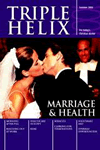When does human life begin? What or who is a human being? This concise booklet addresses these questions, which are fundamental to the biotechnology of human reproduction, including pre-natal and pre-implantation diagnosis, assisted reproduction, human embryo research and cloning.
Five chapters examine 'The Beginning of Human Life' from different perspectives and a glossary of technical terms and appendix of further reading resources are included. Chapter 1 looks at biological aspects, giving evidence that a new human embryo comes into being at fertilisation. Chapter 2 concerns theological aspects, demonstrating that the whole consensus of biblical teaching is that human life begins at conception. Biblical theology emphasises that the status of human beings depends on the fact that they are created 'in the image of God' and not on their attributes or functional abilities. 'The human embryo, at its earliest stage in existence of the human being, already carries the rights and dignities which membership of this most special species entails. Biblical testimony walks hand in hand with the evidence of biology. The supreme man, the man who was also God, began his existence at this point too.'
Chapter 3 is in question and answer format, and addresses common objections, part A on biological or scientific grounds, and part B on the question of personhood. Objections quoted and answered include: 'Bearing in mind the high natural loss of fertilised ova, I find it hard to believe that they are of any great importance to God' and, 'An embryo is only a potential human being before 14 days, although it may be accorded “profound moral respect”'. Chapter 4 gives some applications and the question we should ask of any proposed technique: 'What is this technology doing to human dignity?'
Chapter 5 summarises the conclusions. 'There is no point from fertilisation onwards at which we can reliably conclude that a human being is not a member of the human family, and who is known and called by God, one with whom we are locked in community.' We face a battle of worldviews but we can have confidence in the Christian worldview. As John Wyatt, Professor of Neonatal Paediatrics, indicates: the Christian worldview is true, fitting with science and reality; it works, leading to beneficial consequences for individuals and humanity; it feels right, in accordance with the deepest intuitions of the human heart.
Christian thinking emphasises our responsibility to care for and protect vulnerable, weak and defenceless human beings including the embryo and human foetus (Proverbs 31: 8-9). I would highly recommend this helpful booklet to all CMF members. Even those who hesitate to accept its basic thesis will find food for thought and a challenge to apply radical biblical reasoning to contemporary bioethics.
































